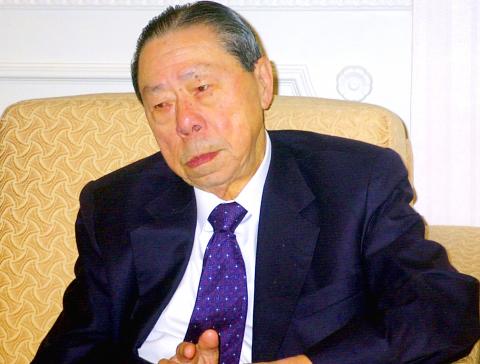Wang Yung-tsai (王永在), cofounder of Formosa Plastics Group (FPG, 台塑集團), passed away at 11:15am yesterday with family members around him, the nation’s largest industrial conglomerate announced.
Wang, who died aged 93, is a younger brother of Wang Yung-ching (王永慶), the other founder of the group.
The younger Wang was called “the grand architect” of the group’s production site in Yunlin County’s Mailiao Township (麥寮) — which encompasses the nation’s sixth naphtha cracker, an oil factory, a power plant and a harbor — because he supervised its construction, which started in 1994, the group said.

Photo: CNA
The production site generates sales of NT$1.5 trillion (US$48.54 billion) a year, an official of the group, who declined to be named, told the Taipei Times by telephone.
Last year, the group, which employs about 100,000 workers, reported revenue of NT$2.45 trillion and said it expected the figure would increase to NT$2.6 trillion this year.
Wang Yung-tsai also helped the group to develop its electronic materials business, which includes Nanya Technology Corp (南亞科技) — the nation’s biggest DRAM chipmaker — and Inotera Memories Inc (華亞科技) — which is a joint venture between Micron Technology Inc of the US and Taoyuan-based Nanya Technology.
The younger Wang was in charge of the group after his brother retired in 2002. He retired himself as vice chairman of the group in 2006, handing over the company to seven people, including group chairman William Wong (王文淵), who is Wang Yung-tsai’s son; vice chairperson Susan Wang (王瑞華), who is Wang Yung-ching’s daughter; Wilfred Wang (王文潮), William Wong’s younger brother; and Sandy Wang (王瑞瑜), Susan Wang’s younger sister.
Before Formosa Plastics Group was founded in 1954, Wang Yung-tsai and his elder brother operated rice and lumber businesses together.
“Currently the group has many important ongoing projects,” William Wong said in an e-mail yesterday.”
“We hope that everyone in the group will learn the simple and diligent style and courage of the group’s two founders to accomplish the goals,” Wong said.
Wang Yung-tsai was five years younger than Wang Yung-ching, who passed away in 2008.
Financial Supervisory Commission Chairman William Tseng (曾銘宗) and Vice Minister of Economic Affairs Bill Cho (卓士昭) expressed gratitude to Wang Yung-tsai for his contribution to the nation’s economy.

TAKING STOCK: A Taiwanese cookware firm in Vietnam urged customers to assess inventory or place orders early so shipments can reach the US while tariffs are paused Taiwanese businesses in Vietnam are exploring alternatives after the White House imposed a 46 percent import duty on Vietnamese goods, following US President Donald Trump’s announcement of “reciprocal” tariffs on the US’ trading partners. Lo Shih-liang (羅世良), chairman of Brico Industry Co (裕茂工業), a Taiwanese company that manufactures cast iron cookware and stove components in Vietnam, said that more than 40 percent of his business was tied to the US market, describing the constant US policy shifts as an emotional roller coaster. “I work during the day and stay up all night watching the news. I’ve been following US news until 3am

UNCERTAINTY: Innolux activated a stringent supply chain management mechanism, as it did during the COVID-19 pandemic, to ensure optimal inventory levels for customers Flat-panel display makers AUO Corp (友達) and Innolux Corp (群創) yesterday said that about 12 to 20 percent of their display business is at risk of potential US tariffs and that they would relocate production or shipment destinations to mitigate the levies’ effects. US tariffs would have a direct impact of US$200 million on AUO’s revenue, company chairman Paul Peng (彭雙浪) told reporters on the sidelines of the Touch Taiwan trade show in Taipei yesterday. That would make up about 12 percent of the company’s overall revenue. To cope with the tariff uncertainty, AUO plans to allocate its production to manufacturing facilities in

Six years ago, LVMH’s billionaire CEO Bernard Arnault and US President Donald Trump cut the blue ribbon on a factory in rural Texas that would make designer handbags for Louis Vuitton, one of the world’s best-known luxury brands. However, since the high-profile opening, the factory has faced a host of problems limiting production, 11 former Louis Vuitton employees said. The site has consistently ranked among the worst-performing for Louis Vuitton globally, “significantly” underperforming other facilities, said three former Louis Vuitton workers and a senior industry source, who cited internal rankings shared with staff. The plant’s problems — which have not

TARIFF CONCERNS: The chipmaker cited global uncertainty from US tariffs and a weakening economic outlook, but said its Singapore expansion remains on track Vanguard International Semiconductor Corp (世界先進), a foundry service provider specializing in producing power management and display driver chips, yesterday withdrew its full-year revenue projection of moderate growth for this year, as escalating US tariff tensions raised uncertainty and concern about a potential economic recession. The Hsinchu-based chipmaker in February said revenues this year would grow mildly from last year based on improving supply chain inventory levels and market demand. At the time, it also anticipated gradual quarter revenue growth. However, the US’ sweeping tariff policy has upended the industry’s supply chains and weakened economic prospects for the world economy, it said. “Now